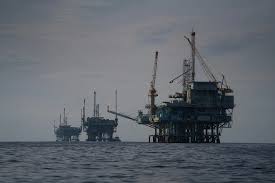President Joe Biden is preparing to ban future offshore oil and gas drilling along the majority of the U.S. coastline, potentially challenging Republican efforts to boost production in federal waters.
On Monday, Biden is expected to announce the withdrawal of 625 million acres from future drilling leases. This would affect the entire Atlantic Coast, the eastern Gulf of Mexico, the Pacific coast from Washington to California, and certain areas of Alaska’s Northern Bering Sea, according to an informed source who was not authorized to speak publicly on the matter.
This move sets the stage for a clash over offshore energy as President-elect Donald Trump aims to rapidly increase domestic oil and gas production, part of his promise to cut U.S. energy costs by half within the first 18 months of his presidency. Biden’s ban on leasing will be enforced through the Outer Continental Shelf Lands Act, which stood up to a legal challenge in 2019 when a federal court rejected the Trump administration’s attempt to reverse an Obama-era ban on offshore drilling near Alaska. This ruling could make it more difficult for Trump to undo Biden’s decision, potentially leaving Congress to overturn it instead.

Both the White House and the Interior Department declined to comment on the matter. While most areas covered by Biden’s proposed ban have not attracted much interest from the oil and gas industry, the eastern Gulf of Mexico is believed to contain significant untapped oil reserves. Efforts to open this region to exploration have faced strong opposition from Florida officials across party lines, as well as from Trump, who issued his own ban on leasing there through 2032 under a 2020 memorandum.
Republicans are working on drafting a comprehensive spending bill that is expected to include provisions requiring the Interior Department to accelerate oil and gas lease sales, particularly in the Gulf of Mexico, which contributes 14 percent of U.S. oil production. They plan to push these measures through using budget reconciliation, which allows the bill to pass with a simple majority in both the House and Senate, bypassing the need for Democratic support.
However, some experts predict that Florida Republicans will use their party’s slim majority to reinforce the ban on leasing in the eastern Gulf of Mexico, which could serve as a final win for President Biden and his environmental legacy. “These are areas where drilling is unpopular, and people want to protect their coastal economies and wildlife,” said Jenny Rowland-Shea, director of public lands at the Center for American Progress, a left-leaning think tank. “It’s unlikely Republicans could push through new drilling and lease sales in these untouched areas without facing significant opposition.”
During his first term, Trump took action to prevent leasing off Florida’s coast as well as South Carolina and Georgia, acknowledging the strong resistance in these states. Energy industry executives argue that while Trump’s actions were more targeted, Biden’s proposed restrictions would be permanent. They contend that as global demand for oil and gas rises, blocking U.S. development simply shifts production to countries with fewer environmental regulations and greater geopolitical risks.
Dustin Meyer, senior vice president of policy, economics, and regulatory affairs at the American Petroleum Institute, stated that voters have expressed strong support for American energy, yet the Biden administration’s flawed policies continue to weaken the country’s energy position.
Republicans are expected to propose new oil and gas lease sales as part of their budget reconciliation package, which seeks to extend expiring tax cuts and enhance immigration enforcement, according to a Republican congressional aide familiar with the ongoing negotiations. However, these lease sales are likely to target areas with little opposition to drilling, rather than regions like the Atlantic Coast, the aide added.
Opposition from Florida Republicans to drilling in the eastern Gulf of Mexico caused division within the House Republican caucus during the previous Congress when they attempted to pass their key energy legislation, H.R. 1 (118). Florida lawmakers insisted on protections against drilling in the eastern Gulf in exchange for supporting expanded lease sales elsewhere in the Gulf, according to a former Republican aide. “The eastern Gulf was a major challenge during H.R. 1, and with a smaller majority, they’ll need all the support they can get to bring members on board,” the aide said. “I wouldn’t be surprised if Florida lawmakers push again to address this issue in reconciliation.”
Environmental groups are hopeful that Florida and other coastal Republicans will oppose their party’s efforts if it attempts to mandate lease sales and undo Biden’s restrictions. However, this does not rule out the possibility of Republicans advocating for more lease sales in areas not affected by Biden’s order, such as the central and western Gulf of Mexico, where drilling is already taking place.
Joseph Gordon, climate and energy campaign director at Oceana, noted that while Republicans are likely to push for expanded drilling under their leadership, many areas were not drilled during previous Republican-led congresses or under President Trump. He pointed out that Trump had withdrawn large sections of the Southeast from drilling, and expressed hope that bipartisan efforts could still be made to protect coastal areas.
Expanding lease sales through legislation would align with a recent trend, as seen with the Inflation Reduction Act, passed by Democrats through budget reconciliation in 2022. That law mandated regular lease sales in the central and western Gulf of Mexico, although Republicans have criticized Biden for delaying those sales.
An energy industry lobbyist suggested that the oil and gas sector might challenge a complete drilling ban in the Atlantic and Pacific oceans in court, even if there is no immediate interest in drilling there, simply to keep the option open. The most profitable drilling opportunities, however, remain in the Gulf of Mexico, with some companies eyeing parts of the eastern Gulf, where they could use existing infrastructure from the central Gulf. “The Floridians will make a big fuss, but it’s really about what Trump wants,” the lobbyist said.


Comments are closed, but trackbacks and pingbacks are open.